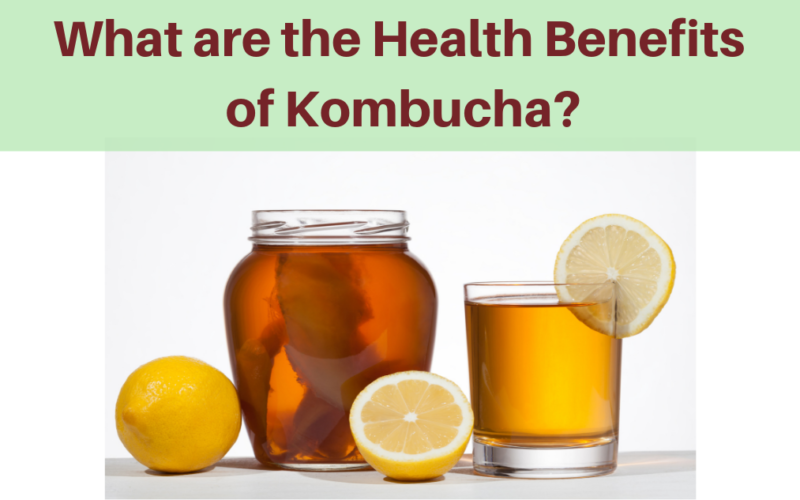What is kombucha?
 Kombucha is a fizzy fermented beverage that originated in China over 2000 years ago. The Chinese refer to it as “the tea of immortality.” It’s made with sugar, water, tea, a starter and a SCOBY. The acronym SCOBY stands for symbiotic culture of bacteria and yeast. The SCOBY looks like a rubber pancake that either sinks to the bottom of the ferment, or floats to the top.
Kombucha is a fizzy fermented beverage that originated in China over 2000 years ago. The Chinese refer to it as “the tea of immortality.” It’s made with sugar, water, tea, a starter and a SCOBY. The acronym SCOBY stands for symbiotic culture of bacteria and yeast. The SCOBY looks like a rubber pancake that either sinks to the bottom of the ferment, or floats to the top.
The bacteria and yeast in the brew feed on sugar. The yeasts break down the sugar into glucose and fructose. As they digest sugars, they give off CO2, which is what makes kombucha fizzy. Other by-products are ethanol and B vitamins, although the B vitamins that are produced are only found in trace amounts.
The bacteria ferment the ethanol into acetic acid, and break down the glucose into gluconic acid.
There are other by-products created during fermentation, but they vary based on the composition of the SCOBY itself, the tea and sugar that are used, the available minerals, length of brew time, the starter culture, and temperature. Alcohol content is typically around .5% but will vary depending on how long it brews. Although each ferment of kombucha is unique, all strains of kombucha contain gluconic acid, acetic acid and fructose.
Why is kombucha healthy?
Most of the health benefits are a result of the gluconic acid and the acetic acid that is found in kombucha. Let’s take a look at both of them.
Gluconic Acid Health Benefits
The primary difference between apple cider vinegar and kombucha is the gluconic acid that is present. And as we said before, gluconic acid is present in all kombucha.
Studies show that gluconic acid reaches the large intestine and stimulates lactic acid bacteria to produce butyric acid. (1)
Butyric Acid Health Benefits
Butyric acid is a short chain fatty acid, and is the preferred food source for the cells in the gut… and we all know that good health starts with a healthy gut. (Butter from grass-fed cows by the way, is one of the few food sources of butyric acid that we have.)
Many scientists think that butyric acid may be the message system between the bacteria in our system and our body, communicating that there is a thriving bacterial colony in the gut.
- Butyric acid has been shown to be effective in treating IBD, Crohn’s disease and ulcerative colitis. (2) (This is why fecal transplants and butyric enemas are gaining more attention.)
- Butyrate has a normalizing effect on colon cancer cells. (3) http://www.ncbi.nlm.nih.gov/pmc/articles/PMC1374147/
- Mice that were fed butyric acid have a lower rate of insulin resistance, which is the precursor to diabetes.
- Butyrate has a direct protective role in cardiovascular diseases.
- Butyrate is absorbed into circulation and is shown to have anti-inflammatory effects.
- Butyrate improves immune response by inducing the production of regulatory T cells. (4)
- Butyrate causes a large and rapid decrease in intestinal permeability (5)
(Leaky gut as we know, is a major cause of autoimmune disease.)
There is also some very interesting research happening in the field of epigenetics. Butyric acid has been found to impact the way genes are expressed. In fact, the use of butyric acid may play an integral role in the future of regenerative medicine. (6)
Acetic Acid Health Benefits
Acetic acid is the main component of vinegar. Kombucha is a much tastier way to enjoy its health benefits. Acetic acid helps to balance the body’s pH, which helps get rid of pathogenic microbes. This is why many people clean their homes with vinegar.
- Acetic acid kills the pathogen H. pylori on contact. (7)
- Acetic acid improves blood sugar control in diabetics. (8)
Vinegar can significantly improve postprandial insulin sensitivity in insulin-resistant subjects. Acetic acid has been shown to suppress disaccharidase activity (3) and to raise glucose-6-phosphate concentrations in skeletal muscle; thus, vinegar may possess physiological effects similar to acarbose or metformin. Further investigations to examine the efficacy of vinegar as an antidiabetic therapy are warranted.
- Acetic acid can kill cancer cells. (9)
Acetic acid is a powerful anticancer agent. Topical application of acetic acid may be a feasible approach for the treatments of gastric cancer and possibly other malignancies.
- Acetic acid helps prevent cardiovascular disease and helps lower blood pressure. (10)
Where can you buy kombucha?
Many grocery stores now carry kombucha, but it’s a pricey beverage. It’s so easy to make at home, once you get your initial SCOBY.
How to get a kombucha starter kit
If you want to start making kombucha at home, I recommend this starter kit:



